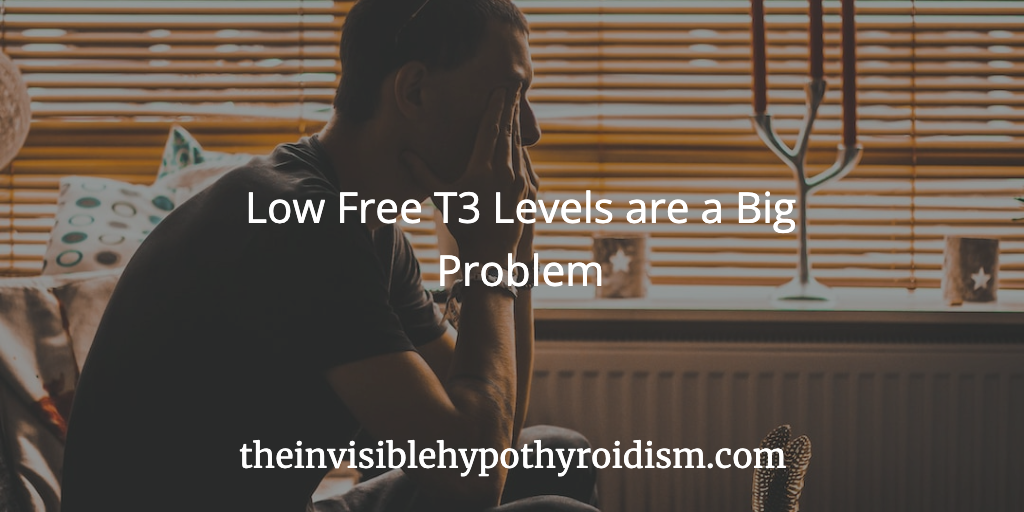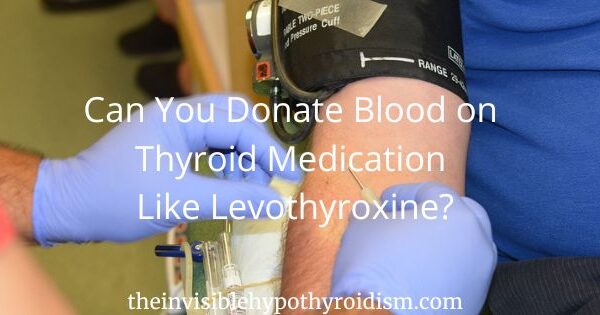Originally published on 24th October 2017 Last updated on 9th February 2024
Do you have hypothyroidism? Are you on medication yet still feel unwell? Could a low Free T3 level be causing you ongoing issues?
Many thyroid patients are not having a full thyroid panel tested, which includes the active thyroid hormone Free T3, and this could be a big puzzle piece as to why they still feel unwell, despite being on medication.
A full thyroid panel includes: TSH, Free T3, Free T4, Tpoab and Tgab.
Many doctors are only testing TSH, and TSH alone is not accurate in the diagnoses and management of hypothyroidism.
Signs of Low Free T3
If thyroid patients have ongoing issues such as mental health difficulties like depression and anxiety, heavy fatigue, muscle aches, pains and cramps, acid reflux, cold sensitivity, weight gain, thinned eyebrows and hair loss, abnormal blood pressure and heart disease (stroke, heart attack, heart failure, cardiac arrest, artery disease), then its possible that a low Free T3 level could be the culprit. This all-important, and arguably the most important thyroid hormone, is needed for every cell and function in the body. As without it in optimal amounts, we can feel really unwell.
Low levels of Free T3 in thyroid patients on medication is more common than we may reealise. Often, doctors tend to just test our TSH alone and when it comes back ‘normal’, they declare us ‘fine’ and send us on our way, even though we still feel unwell. It doesn’t actually check if our thyroid medication is working and raising our thyroid levels optimally.
When my Free T3 was ‘in range’ but not optimal, I had the following symptoms:
Tiredness, fatigue, muscle aches and pains, brain fog, confusion, long recovery period, brittle hair and nails, sensitivity to cold (cold hands and feet), poor appetite, inability to lose weight, slow in movement, thoughts and speech, hoarse voice, thinned eyebrows, constipation, acid reflux, hormonal migraines, anxiety, dry and tight skin, heavy periods, Joint Stiffness and pain, hot flushes, depression, numbness in limbs, weight gain (two stone in under six months), very emotional all the time, wind, constantly itchy and sore scalp and worsening fatigue.
But when my Free T3 reached optimal levels, all of these disappeared.
Issues of Low Free T3
A low Free T3 level leaves you hypothyroid, even if you have a ‘normal’ TSH and ‘normal’ Free T4, too. Low Free T3 levels can also occur with subclinical or borderline hypothyroidism, where TSH levels are declared ‘not that bad’.
There are binding proteins that attach to thyroid hormones to travel through the blood vessels, to cells all over our body. When they reach the cells, only the unbound “free” hormones can actually be used by the cells. Therefore Free T3 levels (and Free T4!) are important to monitor. It’s important to be aware that Free T3 and Free T4 are different to Total T3 and Total T4, so make sure you check ‘Free’.
The cardiovascular system is one of the most important areas on which thyroid hormones act. Both thyroid hormones T4 and T3 are related to heart disease because they affect the heart rate and the amount of blood pumped by the heart. Thyroid hormones help your blood flow smoothly by relaxing the muscles of your blood vessels and keeping your blood vessels open. Hypothyroidism can also lead to high cholesterol, as well as stroke, heart attack, heart failure, cardiac arrest and artery disease.
A study concluded that low Free T3 is a strong predictor of death in cardiac patients and might be directly implicated in the poor prognosis of cardiac patients. [1]
Clinical and experimental evidence has shown that T3 plays a major role in modulating heart rate and cardiac contractility as well as arterial peripheral resistance. [2]
In addition to heart problems, low Free T3 can also cause mental health issues such as depression and anxiety and a whole list of other symptoms.
T3 has an important role in the health and optimal functioning of your brain, including cognitive function, ability to concentrate, mood, memory and attention span, emotions and the ability to cope with life’s stresses. T3 interacts with brain receptors and makes the brain more sensitive to chemicals such as Serotonin and Norepinephrine, which affects your alertness, memory, mood and emotion.
What Causes Low Free T3?
Issues caused by a low Free T3 level can boil down to simple under treatment of your thyroid disease, i.e. you not being on enough thyroid hormone replacement medication, but it can also be caused by an enzyme called iodothyronine deiodinase that is either deficient or not compatible for some people. This enzyme is important in the activation and deactivation of thyroid hormones, such as the conversion of T4 to T3.
A problem with this can therefore cause conversion issues, where TSH can look ‘fine’, as well as a Free T4 level, but with a low Free T3 and continued hypothyroid symptoms and development of other health conditions.
The Bottom Line Is: You Must Make Sure You’re Having a Full Thyroid Panel Checked. Always.
The only way to make sure your Free T3 isn’t causing you any issues or putting you at risk of developing issues or other conditions, is to complete a full thyroid panel, and ensure that your levels are optimal. If your doctor won’t check Free T3 on a blood test, do know that you can order your own online. For those in the UK, Medichecks is a very popular option and LetsGetChecked cover most of the world.
If you are on T4-only medication such as Levothyroxine, Synthroid etc. and still do not feel fully well, then it is possible you could not be converting T4 to T3 and are experiencing the above issues.
Low T3 syndrome is when you have low blood serum concentrations of Free T3, which can be accompanied by a high Free T4, which demonstrates a conversion issue, possibly also with high concentrations of Reverse T3.
Do you always get your Free T3 checked?
You can click on the hyperlinks in the above post to learn more and see references to information given.
References:
[1] https://circ.ahajournals.org/content/107/5/708
[2] https://circ.ahajournals.org/content/87/5/1435?ijkey=5c57078ee27ac8b008c18fd031ac1363d0267316&keytype2=tf_ipsecsha





